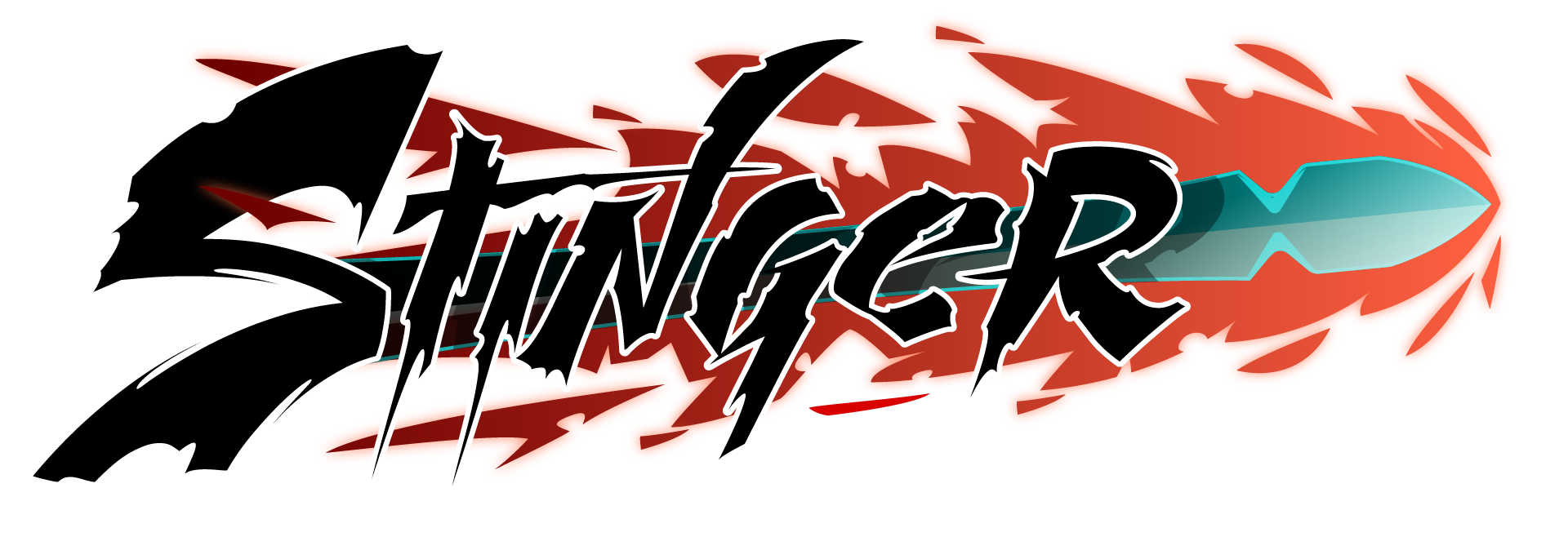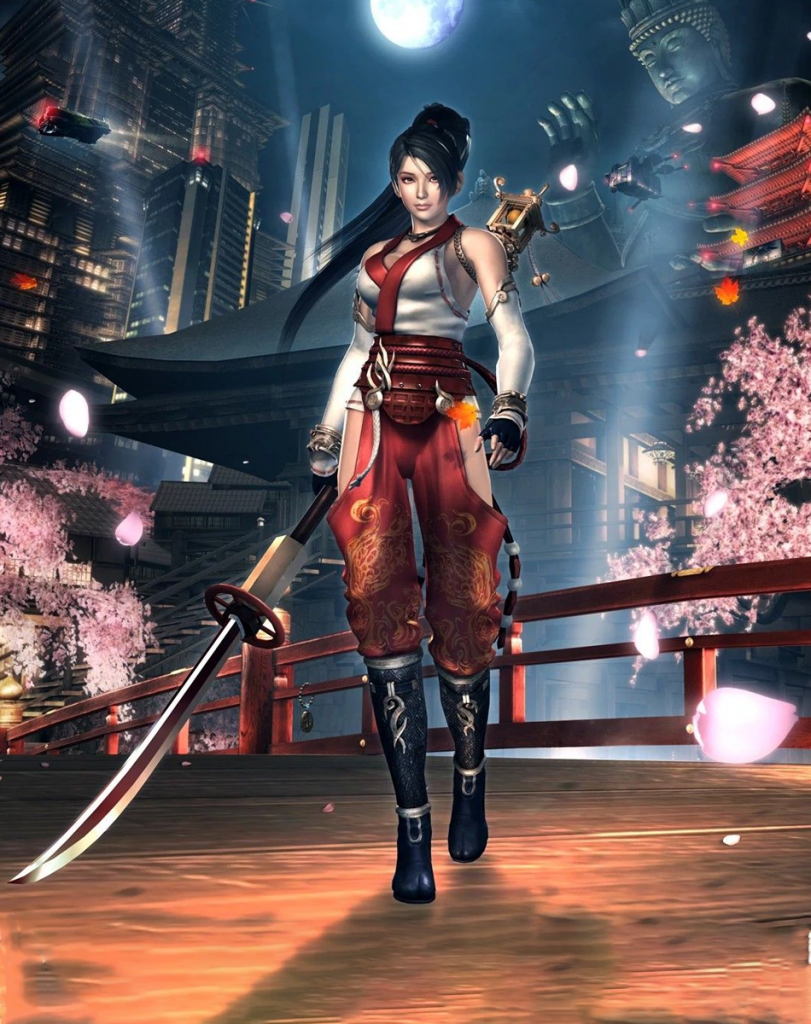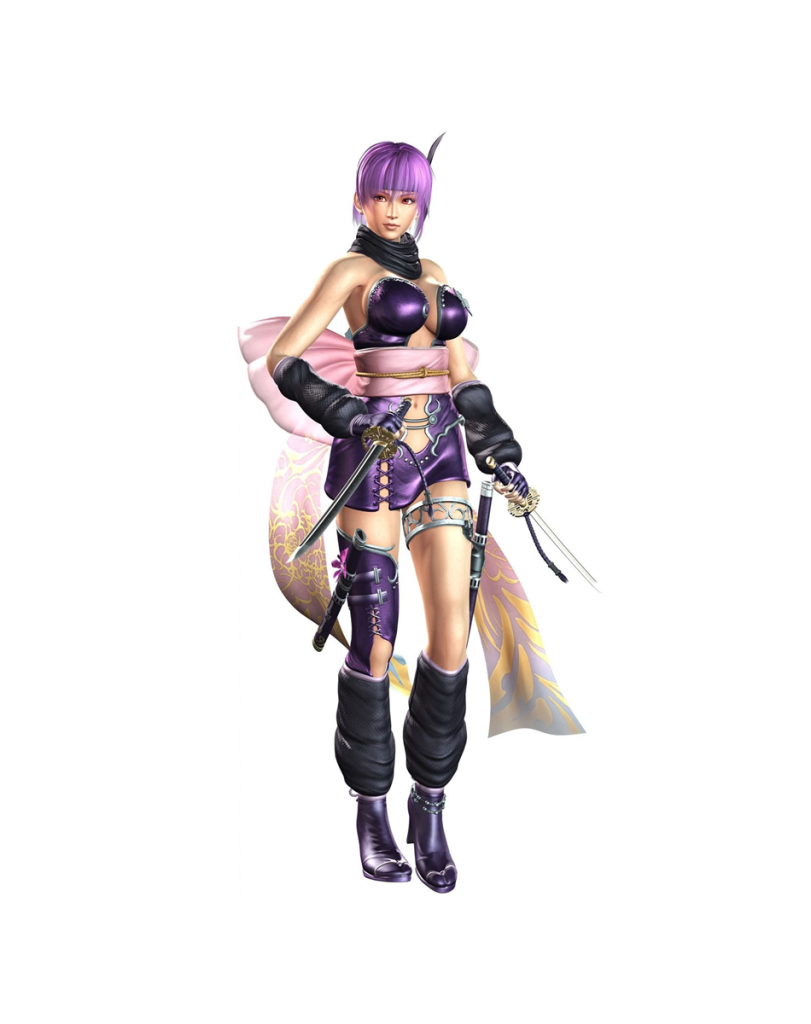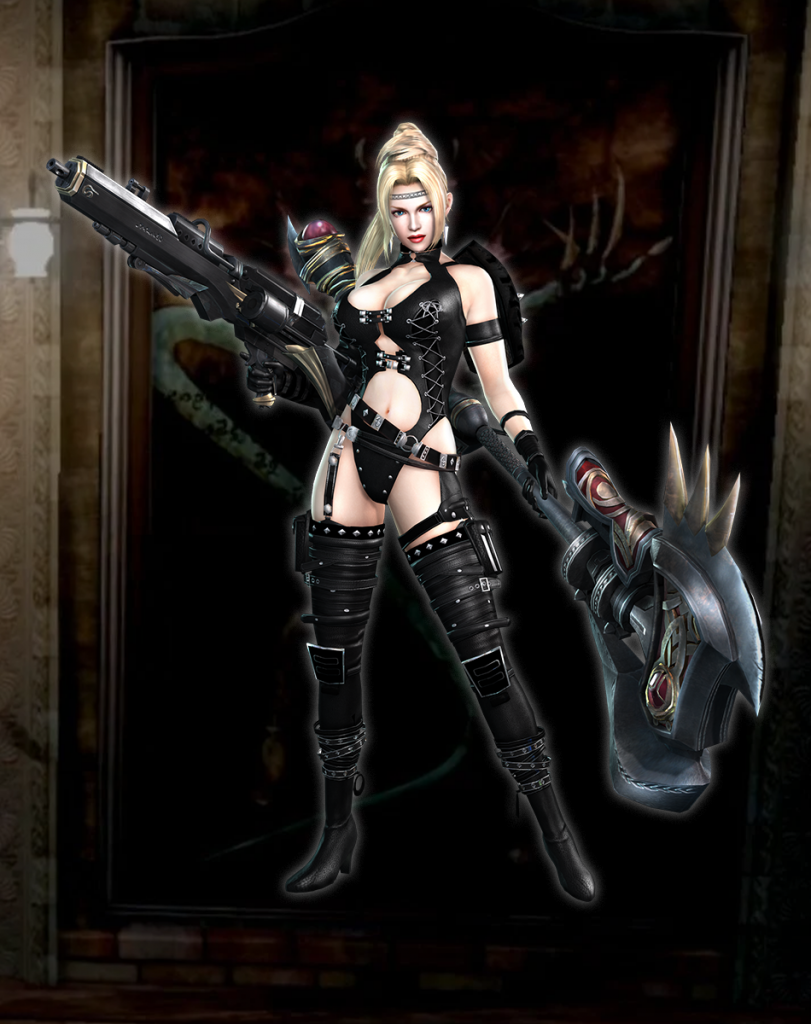This article is a follow-up to the previous article focusing on Ninja Gaiden II and its development that you can read here and here. Happy reading!
Late at night after a hard week’s work Team Ninja is unwinding, the rock and roll bar “Heaven” their retreat. In a corner sits their new director silent and alone. As the team goes their separate ways he ventures off to his own favorite cafe in the middle of the night, writing notes and thinking on how to make their next game even greater. That lonely soul is Yosuke Hayashi. He is:
THE MAN
Hayashi originally worked on the 2004 release of Ninja Gaiden. While the team was suffering numerous setbacks leading to depression and people wanting to leave the project, Hayashi kept his head high. Director Tomonobu Itagaki took notice and said it gave him the confidence that Hayashi was ready for bigger projects, eventually landing him the job to direct Ninja Gaiden Sigma 1 – a remaster of Ninja Gaiden Black for the Playstation 3 in 2006.
As a person, Hayashi is tough to describe. Unlike Itagaki’s honest attempt at a rockstar persona, Tecmo tried to force a similar reputation on Hayashi, even making him star in a documentary entitled “Ninja Gaiden Sigma: Behind the Sword” in order to promote the game. It emphasised his lonely lifestyle juxtaposed by him throwing notes of colleagues in the trash, portraying him more as an evil corporate villain, scary shiny glasses and all.
Yet when asked years later in an interview about what he thought about Itagaki publicly stating he didn’t like Ninja Gaiden Sigma – Hayashi’s directorial debut – he said: “Creating a game is not something you do on your own, it’s a collective effort – and so I would never want to make negative comments about something my colleagues had done“, showing a totally different side than what Tecmo originally had him portray. As with all things, the truth probably lies somewhere in the middle. Itagaki described Hayashi as a man that “never gives up or accepts defeat” while citing words like “determination” and “stubborn” to describe him. These generally point to a man who has strong ideas and works hard, but can be difficult to work with at times.
And with management deciding to port the great but unfinished Ninja Gaiden II to the Playstation 3, entitled Ninja Gaiden Sigma 2, Hayashi would need these traits. It is:
THE GAME
Re-releasing a game is an inviting prospect. It allows artists to do something extremely dangerous, namely go back to their creation to touch up on things that – in their eyes – need fixing. The danger is that the project has already gone public and you never know if that one thing you consider out of alignment is actually adored. With Itagaki and most of his team leaving Team Ninja over internal strife, a new team had to step upi to reevaluate their predecessors’ work and decide how to update it for the new Playstation 3 re-release.
Amongst Hayashi’s late night notes one can imagine finding insights into both fan-and professional reception to the game he was tasked to rebuild. Critics praised the “relentless boss fights”, “upgraded graphics” and “great weapons” while they complained that the title felt “more of the same”, even seeing it win Gamespot’s 2008 “Least Improved Sequel” award. This opinion was shared by publications like PALGN which said that “It’s Ninja Gaiden II, literally in every sense of the word. It doesn’t break any real new ground, but on the other hand, does it really need to?”. And while some praised the game’s difficulty, others lamented its camera stating “players will find the camera a far tougher opponent than Ryu’s enemies”.
Publications and users were in agreement when it came to the game’s performance, disliking it’s slowdown, while archived forum posts show a lot of hatred for bosses like Gigadeath with topics like “garbage game” and “what a jerk“.
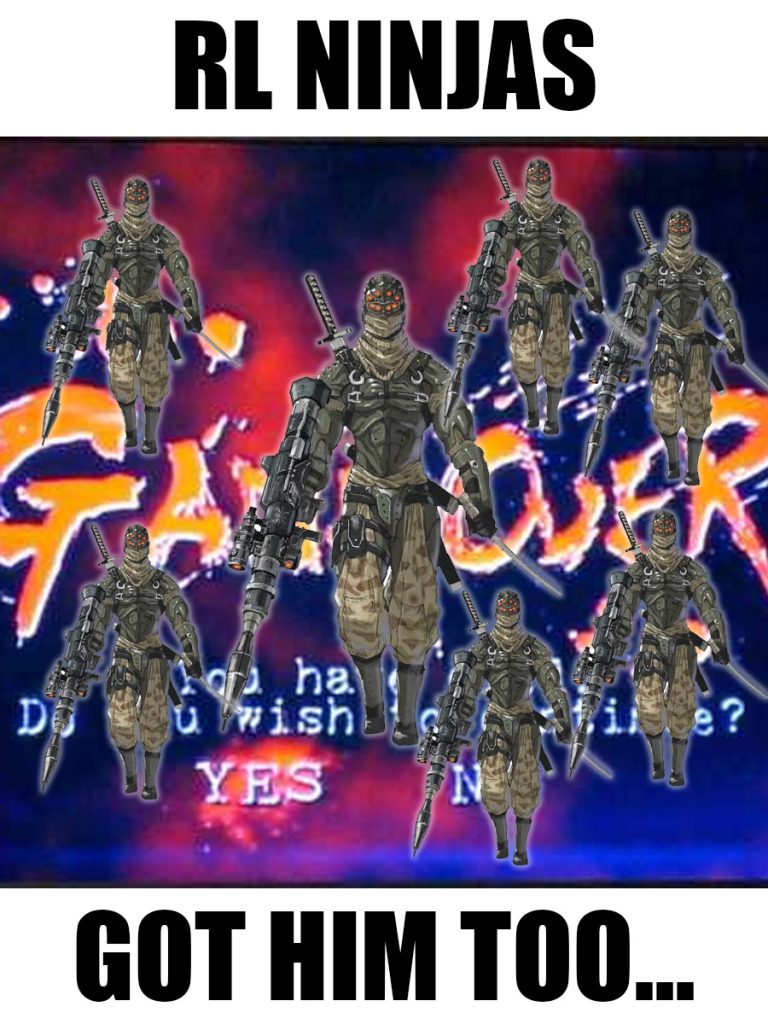
The dislike for the amount of off-screen projectiles got the most notice among players with “RL ninjas got to him too” being a meme for a while, referring to the rocket launcher ninjas making life miserable for new players. Meanwhile the staircase fight started a discussion if its slowdown was intentional or not.
All this paints a clear picture which is strengthened by comments from the old team with director Tomonobu Itagaki noting “we ran out of time for balancing. That was a tragedy. Really”. But with action combat as tense and – frankly – nuts as Ninja Gaiden II, that was just in the details. The game simply needed fixing, touching up. The downside of reading too much into these criticisms is that it can be hard to know where the faults actually lie, as you’re only hearing their conclusions, not the exact part that frustrated or annoyed. Our previous article on Ninja Gaiden II showcased just how different the title was to its predecessor when analyzed in-depth, but on the surface that was apparently not immediately visible to journalists who awarded it the “Least Improved Sequel” award as mentioned before. As noted in our earlier God of War 2018 article:
Oftentimes public perception is based around the initial impression, and in such a short time it can be hard to nail down exactly where the dislike comes from, which leads to a speculative conclusion. This is a common practice in the creative industry when working with non-creative customers and clients, where a statement like “I don’t like that design, change the color to white” means the creative director should wonder what lead him to that conclusion, and not just simply change the color to white. There’s usually a completely different thing bothering the client, and changing the color to white is just that person trying to come up with a possible, and often erroneous, solution.
Perhaps with that in mind, sitting in that bar by himself, Hayashi then made one crucial decision. Ninja Gaiden Sigma 2 would not simply be a touching up of the original title that people were clamoring for. It would be the ultimate Ninja Gaiden game, a culmination of all the versions that had come before. Showcasing that Itagaki was correct… Hayashi was very stubborn.
Consulting with Lead Enviromental Artist Hideki Niimi, Hayashi decided to re-build Ninja Gaiden II within the engine they built for Ninja Gaiden Sigma 1. It supported more lively colors, a smooth frame-rate and was better suited for the Playstation 3’s architecture, which was generally more difficult to program for than the Xbox 360 due to its SPU Cell Processor. Other choices were also quickly made with the term “ultimate” at its core, like the return of fan favorite characters Ayane and Rachel as playable characters, in addition with Momiji from the Nintendo DS game Ninja Gaiden: Dragon Sword. Old bosses would also return, really making it feel like Ryu’s final adventure.
To describe the changes between the eventually released Ninja Gaiden Sigma 2 and it’s originator Ninja Gaiden II, it is best to first look at what remained untouched. As the first mission starts Ryu immediately moves the same and the environments – though more colorful thanks to the new engine – are the same as well. While laying waste to the familiar selection of enemies you’ll quickly realize that on the surface the game is very similar. It still features the original fourteen mission and the same eight melee weapons for Ryu to do his bloodletting with.
However, the deeper you dive, the more little changes you’ll notice. For starters, Ryu lost access to most of his ranged weapons, now instead having constant access to his shurikens on the Circle button while the R2 shoulder button is now used for the Fiend’s Bane Bow or the new Howling Cannon. Your ranged weapons also are no longer able to use Ultimate Techniques. Pair this with enemies having less ranged options in general and it is clear that the original game’s emphasis on ranged combat has mostly been removed, giving a more face-to-face feeling like in Ninja Gaiden Black.
This feeling is further heightened by the game’s change to the quantity in which enemies appear. Ninja Gaiden II was originally a title of tense, crowded fights. In Ninja Gaiden Sigma 2 however these encounters are much smaller, with some fights only having three to four enemies on screen at once. This was possibly done in an attempt to keep a more stable frame-rate, similar to the removal of the blood. To compensate, enemies were made even more aggressive than before and their health and resistance to being delimbed greatly increased. To in turn compensate for this change, Ryu gained access to a new weapon, the slow but hard hitting Enma’s Fang, while other weapons had their damage values slight retweaked and some infinite loops on enemies were removed. Upgrading weapons are also no longer done via spending essence, but via predetermined moments in the game.
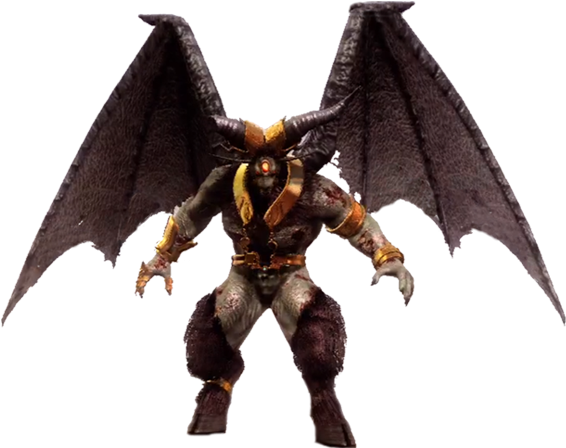
Meanwhile some bosses like the “Giant Death Worm” are removed entirely while others returned, like Marbus, trying to take revenge on Ryu for his demise in the first game. The three female characters now each have their own short little chapter, remixing existing missions to create new levels for them to go wild in. With Rachel bringing her ranged machine gun to the table and Momiji being the only one having a double jump and aerial Ultimate Technique, they each bring a new play-style to the table. Though barely worth mentioning, they also support the Playstation 3’s Sixaxis for some personal ‘rest and relaxation’ should the stress of being a Master Ninja prove too great for the player.
Now, when written down these changes sound interesting, but how does Sigma 2 actually play compared to its original release? With enemies now having much more health to compensate for their lower numbers and them dealing much higher damage, fights are more considerate. Instead of dying slower than your enemies, you play a more defensive game. You don’t risk too many parries, instead one baits and punishes foes for their mistakes, especially since one grab is an instant death on the highest difficulty. It feels like playing Ninja Gaiden II, but with the mindset of Ninja Gaiden Black. While one can still play offensive, stylish and toy with counters, it is far more risky now than it ever was. While at its core there’s a sort of eb and flow present, with Team Ninja making minor changes and then new changes to compensate for those they made, the changes slowly start to come together to form a new game with a clear direction. To be the best of both worlds, of Ninja Gaiden Black and of Ninja Gaiden II.
In doing so however, what made Ninja Gaiden II the game that it was is slowly getting lost. With risks being higher, the “die slower than your enemies” mentality – ironically – died and the brutal fights in the campaign where you survived by the skin of your teeth are replaced by longer, smaller and less bloody fights where you either prevail unscaved or die in a single hit. And with the combat system originally being designed to deal with multiple foes, the reduced enemy count simply makes for an easier game as Ryu is far too capable to deal with two ninjas at once, no matter how durable they are.
Furthermore not all of these additions were done flawlessly either. Enma’s Fang is a slow, high damage weapon, and thus suffers from filling the same role as the Eclipse Scythe, making it feel less unique. The chapters where you play as one of the femme fatales also tend to interrupt the flow of the adventure and would’ve been better suited for their own little campaign. Meanwhile, they cannot be selected for play outside of their own missions, giving them very limited game-time.
Perhaps one of the biggest changes though to Ninja Gaiden Sigma 2 – and the series as a whole – was removing its Mission Mode in favor of an online co-op mode where two players dive into a selection of missions together. While the series already had one, this is where they shined. They were:
THE COMMUNITY
The online mode was divided into 10 missions per difficulty, with Master Ninja only having 5 to close it out, or so players thought. Once all had been conquered a little surprise awaited in the form of a new name: Ultimate Ninja. Starting the first one players were immediately confronted with facing three of the four greater fiends on the highest setting. Even the best, more prepared ninjas would only survive a few seconds on their first attempt. Trying the second mission they were met with wave after wave of foes, but they eventually make it through through and reach the boss Obada who, after a harsh fight, falls too. The players cheer, thinking it wasn’t too bad. And then Fiend Genshin, one of the final bosses in the campaign, appears not once, but three times at once, and a celebration turns to a memorial.
These side-missions were where Team Ninja laid down an offer to the player. They know you are good to have reached this point, so there’s no longer a need to hold back. Most games, even Ninja Gaiden, hold back in their campaigns even on the highest setting, because they want to be conquered, but with these it is different. While Ninja Gaiden Sigma 2’s campaign could be considered one of the easier ones to beat, these missions are not meant to be conquered, they weren’t designed to be fair. They were a test.
Ultimate Ninja 01 and Ultimate Ninja 02, often referred to as UN1 and UN2, brought players closer together than ever. Originally divided, now the ninjas had a common goal. It took nearly two months before Japanese players junjun1598 and alby0689 – as shown above – conquered the infamous trials. Even to this day carrying the trophy for beating these missions is considered an honor.
Interestingly, over the years certain glitches were uncovered that made these challenges more doable, but the community has tried to keep these a secret, with one only being known to a select few – never to be shared. “Only those who learn can beat it” – spoke one such ninja in an interview. “It is a waste if you beat it using these methods, and spits in the face of those who worked so hard for months to master tactics to stand a chance. Learn, fight, survive, and get back up again, just like they all did. The feeling of satisfaction is worth it,” he continued. “But never forget there is no shame in giving up”. With that said, now it is time for:
THE CONCLUSION
Slowly, with all these changes, additions and expansions put together, one can say that on paper Hayashi succeeded in his mission: he made the ultimate Ninja Gaiden game. The title’s playstyle is a mixture of Ninja Gaiden Black and Ninja Gaiden II, with the best of both combined. It offers loving tributes to the serie’s history with returning bosses like Marbus, Rachel being playable and the addition of new and innovative content.
But when playing through its campaign’s beautiful vistas, the fights can feel hollow. The brutality and – let’s be frank – insanity of the original that held it back also made it such a memorable title. And it is exactly those things that are missing in Ninja Gaiden Sigma 2’s campaign, only to be found in a handful of the later trial missions.
As a whole one can view Ninja Gaiden Sigma 2 as taking steps in numerous directions compared to its original iteration. And which version you like more will end up being which steps taken were most important to you. Do you prefer crazy fights? Do you want a more stable game? Online? Offline? Do you like ranged combat or hate it?
Instead of an improved version of Ninja Gaiden II, fans were treated to a title that offered an alternative. An alternative that is a better game than Ninja Gaiden II, there’s no doubt about that, but it isn’t better. Not by a long shot.
鑒 reflection style 鑒
In this short section I reflect on the article from my own viewpoints as a gamer and lover of the genre instead of a critic.
It is really hard to be positive about Ninja Gaiden Sigma 2, for numerous reasons. It is a game that changed a lot about a beloved game. Defending the game in the community as such rarely ends well. But in a sense, there’s a lot to be thankful for: this site for instance. Ninja Gaiden Sigma 2 was the first Action game I played, ever, and its Ultimate Ninja challenges saw me enter a community that eventually led to me starting this site and its forum.
I recall getting the Platinum trophy for Vanquish and bragging about it to a friend, saying I had conquered the “hardest achievement in gaming” – how arrogant I was. He then gave me his copy of Ninja Gaiden Sigma 2, saying it was even harder. I brought it home and was quickly discouraged, not understanding the basic concepts. The result was this topic:
https://gamefaqs.gamespot.com/boards/958890-ninja-gaiden-sigma-2/58689346
This was followed by a then nearly three page rant I sent to my friend, that is now sadly lost to time. I recall removing the disc from my Playstation 3 and looking at it. I put it away, and lasted all of 5 minutes before I put it back in. “No game will beat me”. And eventually, it clicked. And I loved it, eventually pouring in nearly a 1.000 hours and introducing me not only to community members like Bick Benedict, Phandral and MoaninR0nin, some of whom I still talk to to this day, but also to titles like God of War, Devil May Cry and off-beat titles like Dante’s Inferno and my eternally adored Metal Gear Rising: Revengeance.
After playing the original Ninja Gaiden II many years later, I can see the changes and no longer prefer Sigma 2. Yet I also feel the game gets unnecessary amounts of hate for being such an excellent title that puts good stable gameplay above all else. It isn’t perfect, neither is the game it is based off of, but there is good to be found in it.
斬 postscript notes 斬
Short notes that didn’t make it in the final article, but are fun to read regardless!
1. While installing the game players are treated to a semi animated comic book of Ryu and his father fighting a vampire. Not only does this have no relation to the story and only serves to confuse newcomers, you can never re-read it without installing the game again. A bizarre omission;
2. Doing more research into Yosuke Hayashi for this article, I honestly feel bad for the man. Even in a documentary about him, he’s thrown to the wolves and portrayed in a very bad light. I wonder if this was their intention…
3. Ninja Gaiden Sigma 2 was the first in the series to have a collectors edition, and it wasn’t that great, offering only a steelbook, soundtrack cd and the aforementioned comic;
4. In an interview, Tecmo CEO Yoshimi Yasuda spoke about Hayashi, and said: “His succes is really going to be determined by our fans, so I hope they enjoy his creations and look forward to his games”. I found this to be very interesting, since Hayashi is commonly referred to as Hayashit these days, yet he is still making games;
5. Years later fans of the original Ninja Gaiden II thought they’d get another shot at their dream game with the re-re-release of Ninja Gaiden Sigma 2 Plus for the Playstation Vita. Instead this version followed a similar strategy of one step back, one step forward. It was portable, but only its framerate was cut in half. Blood and gore could be enabled, but doing so would drop the framerate even more. There were new modes, but old ones weren’t re-added. The co-op was gone, but you now had to do all the co-op missions solo with an AI-controlled partner. As a result, it is one of the few titles that has zero Platinum Trophy owners;
6. 1up’s review of the original NG2 gave this delightful quote: “The saving grace here is the fanbase. If you’re in this group, there’s no reason why you won’t love Ninja Gaiden 2, despite its faults. You don’t care about next-gen graphics, level design and fairness, right? You like having Tomonobu Itagaki stamp on your ego, rob your of sanity and piss down your throat. You’re going to switch on the Ninja Cinema mode and upload every single video of yourself getting more than a 100 hit combo to Xbox Live and pat yourself on the back when you suffer a massive coronary halfway through the final difficulty mode”. Someone was not happy;
7. Funnily enough, the Platinum Trophy for Ninja Gaiden Sigma 2 is the only one first time completers junjun1598 and alby0689 own;
8. I originally wanted to make a mention to the Buddha and Statue of Liberty bosses and how they played more into the current day trope of larger than life bosses like in God of War. I eventually let this out;
源 sources 源
https://www.youtube.com/watch?v=Z8lw_48Z-SA
https://www.reddit.com/r/ninjagaiden/comments/7g2k1g/if_i_love_ninja_gaiden_black_how_blown_away_will/dqhwe76/
https://www.youtube.com/watch?v=hk1nM7PsmlI
https://www.youtube.com/watch?v=-OdPcRhqgKs&feature=youtu.be

